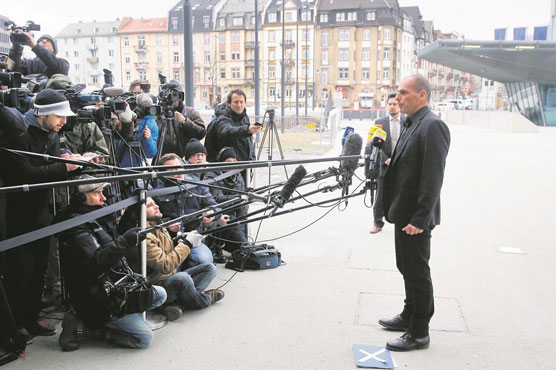ECB more optimistic on growth, stays tough on Greece

ECB plans to buy 60 billion euros of private and public bonds each month for at least 18 months
NICOSIA (AFP) - The European Central Bank expressed confidence Thursday that its bond buying programme, which begins next week, would help drive the eurozone economy out of its doldrums, but the bank retained its tough-talking stance on Greece.
At the ECB s regular policy meeting, held in Nicosia, Cyprus this time instead of the usual venue of Frankfurt, the governing council voted to hold its key interest rates steady at their current all-time lows.
And ECB chief Mario Draghi sounded more upbeat than he has for a long time on economic prospects, not least as a result of the bank s programme of quantitative easing, or the widescale purchase of sovereign bonds.
The ECB plans to buy 60 billion euros ($68 billion) of private and public bonds each month for at least 18 months in a bid to ward off deflation.
Draghi announced that the bond purchases would start on March 9 and continue at least until September 2016, or when area-wide inflation started moving back towards the ECB s target of around 2.0 percent.
- Positive effects of QE -
==========================
The QE programme, combined with the series of other liquidity measures, was already having a positive effect, Draghi said.
"In particular, borrowing conditions for firms and households have improved considerably. Moreover, money and credit dynamics have been firming," the ECB chief said.
The ECB s ultra-easy monetary policy "supports and reinforces the emergence of more favourable developments for the euro area economy," Draghi insisted.
"In an environment of improving business and consumer sentiment, the transmission of our measures to the real economy will strengthen, contributing to a further improvement in the outlook for economic growth," he said.
Draghi s confidence was backed up by an upward revision of the ECB s growth forecasts, which now see the area-wide economy expanding by 1.5 percent this year, 1.9 percent in 2016 and 2.1 percent in 2017.
Even inflation, which was expected to slow to zero in 2015, would pick up to 1.5 percent next year and 1.8 percent the year after, the forecasts showed.
The ECB defines price stability as inflation rates close to but just below 2.0 percent.
- Overly optimistic? -
======================
ECB watchers noted Draghi s more upbeat tone, but suggested he might be being overly optimistic.
"The ECB made it clear that it believes in the effectiveness of its bond purchase programme," said Commerzbank economist Joerg Kraemer.
But "the bar is high, raising the probability of the ECB s expectations being disappointed, as has so often been the case," he warned.
"The ECB s macro-economic assessment sounded as if the ECB is a bit inebriated by its own QE announcement. It was the most positive and optimistic assessment in a long while," agreed ING DiBa economist Carsten Brzeski.
Oxford Economics economist Ben May said that "while the strengthening recovery and rising inflation expectations suggest that the threat of deflation is diminishing, a sustained period of below target inflation remains on the cards."
Against this backdrop, talk of QE "tapering" would be "far too premature," May said.
"Nonetheless ... QE will not be extended beyond the current planned end date of September 2016," the expert said.
- Tough line on Greece -
========================
Amid all the bullish talk, Draghi continued to take a tough line on Greece.
The ECB recently cut off a key channel of financing for Greek banks, saying it would no longer accept Greek sovereign bonds as collateral for loans.
That means they now rely solely on emergency liquidity assistance (ELA) which is more expensive than normal central bank refinancing operations.
Draghi insisted that the ECB was prepared to restore the first channel of financing, but only once Athens reaches a debt deal with its eurozone partners.
"The ECB is the first to wish to restart lending to the Greek economy providing the conditions are in place," Draghi said.
"If certain conditions are in place as far as economic policy is concerned, that would make the governing council think that in some time from now bonds would again be eligible," he said.
Berenberg Bank economist Christian Schulz felt Draghi had "sent a conciliatory but firm" message.
"The ECB stands ready to support Greece, but only if the bail-out review is completed successfully. At the current stage that is not the case yet," Schulz said.

